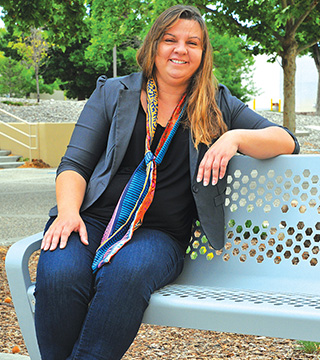
GIVING BACK — Computer scientist Sandra Faust, a mother of two, reaches out to Albuquerque young people through a weekly math club. “Getting the younger generation involved in STEM, in particular girls, minorities, and the disadvantaged, is very important to me,” she says. “As a professional, I offer another point of view without the grades, tests, and other pressures. I am free to expose children to aspects of math not covered in the classroom, like hands-on activities and games.”
Aleksandra Faust’s family got lucky as civil war raged in their native Serbia. They were tapped in 1995 for US permanent residency in what is known as the green card lottery, which makes thousands of resident visas available each year to natives of countries with low rates of immigration to the United States.
Sandra’s father, mother, and brother quickly fled the fighting but she stayed behind to finish a bachelor’s degree in mathematics at the University of Belgrade. “Education is important to me,” Sandra (5563) says. “The war situation was really bad. I knew that a degree was critical to getting a job and succeeding in the United States. It was a risk to stay behind but it was a bigger risk to quit and start over.”
Two years later, degree in hand, Sandra rejoined her family in Michigan where she worked in industry a few years. Education called again, and she enrolled in the University of Illinois at Urbana-Champaign, earning a master’s degree in computer science in 2004.
Sandia hired Sandra in 2006 and in the fall of 2012 she entered the Labs’ Doctoral Studies Program to pursue a PhD in computer science at the University of New Mexico. She graduated last summer.
Sandra left UNM on a high note. The university announced recently that she won the 2015 Tom L. Popejoy Dissertation Prize recognizing the highest level of academic excellence among doctoral students.
“This is a prestigious award, extremely competitive, juried by tenured faculty members and the dean of Graduate Studies,” says Margaret Gonzales of the UNM Graduate Studies Department. “It’s the only dissertation award provided by UNM that is university-wide.”
How to program a robot
Sandra’s dissertation, “Reinforcement Learning and Planning for Preference Balancing Tasks,” centered on robotics and started with the problem of how to control an unmanned aerial vehicle that carries a suspended load (see abstract at right). “Robots are becoming ubiquitous in our daily lives, from cleaning homes to building cars. Advances are being made, but there are challenges,” says Sandra’s UNM adviser Lydia Tapia. “It is often a difficult and manual process to program a robot to perform a task.”
Sandra’s thesis put forth new learning-based algorithms to program complex, high-dimensional robotic systems. She also provided mathematically rigorous stability guarantees of robots’ behavior, and application to several complex robotic tasks.
She developed a framework, called PEARL, that addresses three major challenges of robots learning motion-based tasks: efficiency, safety, and adaptability. Her thesis led to a provisional patent and publication of numerous technical papers.
Sandra recently began a Laboratory Directed Research and Development project in geosciences using methods developed in her thesis to adaptively change seismic data processing parameters on the fly for more accurate seismic event characterization and detection. And she is working on the Hardware Acceleration of Adaptive Neural Algorithms, or HAANA, Grand Challenge. HAANA is developing a data analysis platform that uses neural-inspired algorithms and hardware to rapidly identify, learn, and track the evolution of threats.
Dissertation with technical, logical, and social impacts
Gonzales says the Popejoy Award jury was extremely impressed with Sandra’s dissertation. “They said it was well written and exhibited a balance between theory and application,” she says. “They concluded the research has deep technical, logical, and societal impacts.”
Sandra says she chose UNM for her doctorate so she could work closely with both the university and Sandia. “My goal was to bridge the collaboration between the Labs and UNM,” she says. “UNM maintains a high level of research and is in the top 100 computer science graduate programs in the country. And I received tremendous help and support from within Sandia all along the way.”
She says UNM provided more than just a technical education. “I didn’t expect to get such a great mentoring experience in terms of career, writing, and presenting myself,” she says. “It was really great to work one-on-one with a mentor.”
Sandra, who received the Popejoy Award at UNM’s spring commencement, says she was overwhelmed at the honor. “It is an endorsement of the research I developed,” she says. “I am excited to apply what I learned to challenges facing the Labs.”
And she says the award took her back to the commitment to education she made in war-torn Serbia. “It is a confirmation that years of hard work do pay off, and that in this country one does not need to be privileged to succeed,” she says. “I immigrated to the United States to escape wars in the Balkans. I arrived with a diploma in math, two suitcases, and a desire to live a dignified life, working hard. I worked three jobs during my first year in the States. Over the years, I invested in furthering my education. I worked on what I am passionate about and expanded my personal and professional network. This award is the crowning achievement of that effort.”